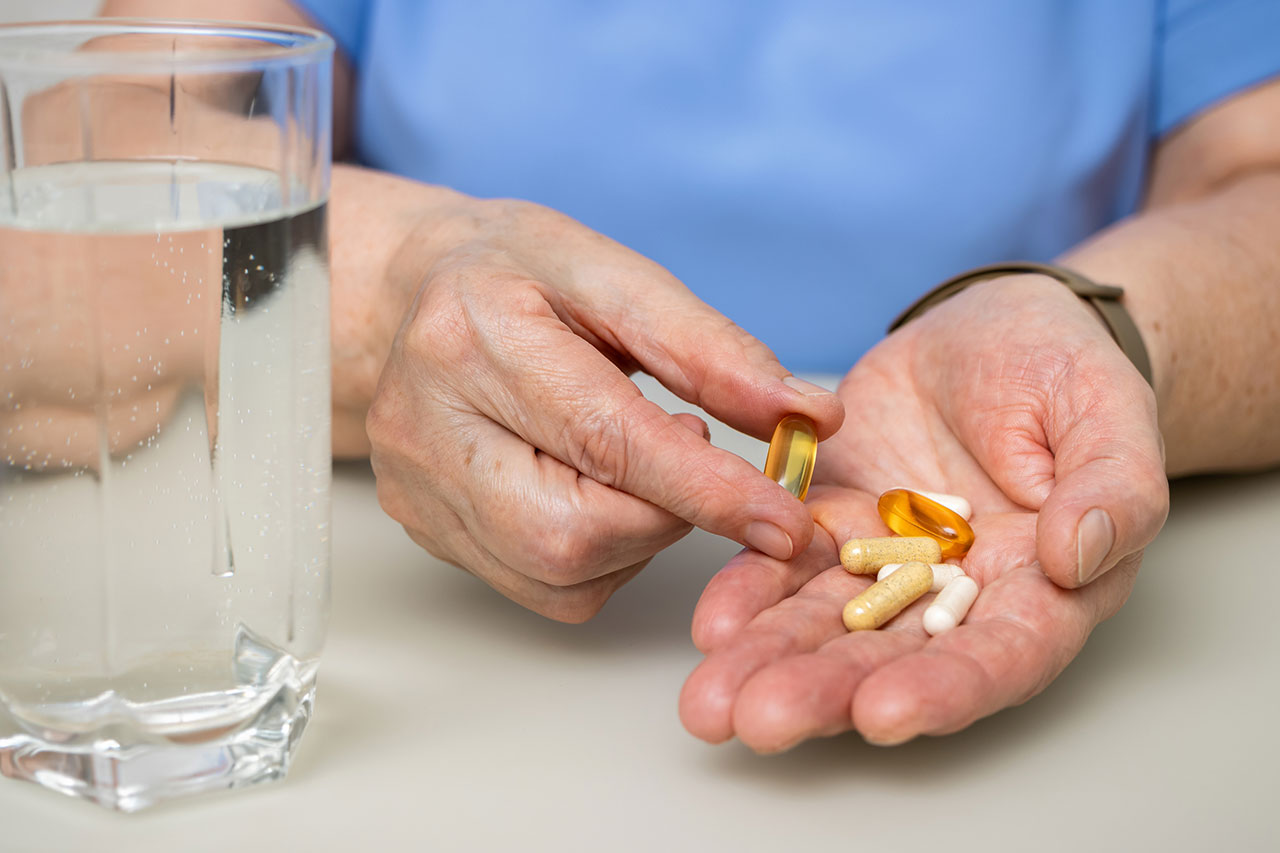Did you know that a vitamin B12 deficiency can cause symptoms that mimic depression? In some cases, the right supplement might make a bigger difference than you’d expect. Depression doesn’t always look the same as we age, and it’s not something you just have to live with. While therapy and medication help many people, some older adults are turning to supplements for depression treatment.
Your Prescriptions Sorted and Delivered
Backed by growing research, certain vitamins, minerals, and natural compounds may support mood, energy, and brain health. Read on to learn which supplements are worth considering, how they work, and what to discuss with your healthcare provider. If you’re looking for alternative ways to feel more like yourself again, you’re in the right place. Let’s explore your options.
Supplements That Will Help You Fight Depression
These eight supplements may help ease depression and support a better mood over time:
1. Omega-3 Fatty Acids
The Omega-3 fatty acids, EPA and DHA, are essential for maintaining brain health. Older adults who have low levels of these nutrients face a higher chance of developing depression. Research suggests that omega-3 supplements rich in EPA moderately reduce depressive symptoms in individuals who are not getting enough omega-3’s. They work by supporting neurotransmitter function and reducing inflammation — two key factors linked to mood disorders.
Common sources of marine omega-3s include fish oil, krill oil, and algal oil, with algal oil being the best option for vegetarians and vegans. Older adults who don’t eat much fish may benefit from taking supplements daily. You should aim for 1,000 mg of combined EPA and DHA for coronary heart disease prevention. However, it’s best to get personalized recommendations from your healthcare provider. For clients who do not eat marine food sources, the International Fish Oil Standards (IFOS) is a great website to check out if you are seeking a higher quality fish oil supplement.
2. Vitamin D
Vitamin D is popular for its role in bone health, but it’s also key to mood regulation. Many older adults are deficient due to limited sun exposure or lower skin absorption. Additionally, at latitudes above 37 degrees north (i.e., much of the northern United States) and below 37 degrees south of the equator, the sun’s rays are too weak for the skin to synthesize adequate vitamin D for most of the year, especially in fall and winter. A study found that low vitamin D levels were associated with a 75 percent increased risk of depression in older adults.
Vitamin D supports serotonin production and brain function. Supplements come in D2 and D3 forms, with vitamin D3 being more effective at raising blood levels. Vitamin D3 supplements can also be found in combination with vitamin K2, which may have additional benefits for bone and heart health. Typical doses range from 400 to 4,000 IUs daily. Regular blood tests can help determine the right amount for your needs year-round.
3. B-Complex Vitamins
B vitamins (especially B6, B9, and B12) play a big role in how your brain works and how you feel. They help make and regulate key mood chemicals like serotonin and dopamine. Without enough B vitamins, deficiencies will develop. As we age, getting enough B vitamins gets harder due to decreased appetite and stomach changes. Stomach acid secretion decreases, which makes it tougher to absorb vitamin B12 from food. Some drugs, like antacids or metformin, can decrease vitamin B12 levels as well.
Fortunately, vitamin B and B-complex supplements can help close the gap. Avoid high doses unless your healthcare provider advises otherwise.
4. Magnesium

Magnesium helps calm your nervous system, enhances sleep quality, and stabilizes your mood. When any of these functions get disrupted, it can increase the risk of developing depression. Magnesium is used in numerous bodily processes, including those that support brain health. Research has shown that magnesium supplements can significantly improve depression and anxiety within 6 weeks.
Older individuals frequently have low magnesium due to poor intake and medication usage. You can get magnesium through many foods, such as spinach, pumpkin seeds, chia seeds, cashews, almonds, and beans. If you are not getting adequate levels in your diet, you may want to consider a magnesium supplement. Magnesium glycinate or citrate absorbs well. The recommended dietary allowance (RDA) for magnesium for older adults aged 51 or higher is 420 mg/day for men and 320 mg/day for women. With consistent intake, you will experience improved health and possibly lower stress.
5. Zinc
Zinc plays a powerful role in brain health. It facilitates communication between nerve cells and regulates the stress response mechanism. A decrease in zinc levels usually results in a negative impact on mood. Studies have revealed that depressed patients exhibited persistently lower zinc levels in their bloodstream compared to non-depressed individuals. The association is not random because additional research shows that zinc supports brain adaptation, development, and restoration.
A meta-analysis found that high zinc intake was associated with a 28% lower risk of depression and that supplementation significantly reduced depressive symptoms. Natural sources of zinc include meat, legumes, and seeds. However, dietary supplements provide extra zinc where food sources fall short.
6. Saffron Extract
Derived from the flower of Crocus sativus, saffron has been studied for its potential antidepressant properties. Research indicates that saffron might enhance the activity of serotonin, a neurotransmitter associated with the regulation of mood. Moreover, antioxidant-rich saffron could help protect brain cells from oxidative stress, which is known to exacerbate many mental health conditions.
Older adults may find saffron to be a mild alternative treatment. This is because it’s well-tolerated and has fewer side effects than many antidepressant medications. To get the most out of this supplement, choose high-quality extracts.
Medbox: Simplify Your Prescription Routine
7. L-Theanine
L-theanine is a natural way to feel calmer without feeling sleepy. It boosts alpha brain waves, which help you feel relaxed but alert. It also supports key brain chemicals like serotonin and dopamine. A small study found that people with mild depression who took 250 mg/day of L-theanine for 8 weeks with their current medications reported less stress, better sleep, and improved mood. Since it is not widespread in foods (it can be found in green and other teas, as well as some mushrooms), many people choose L-theanine supplements. Additionally, a small RCT study showed that L-theanine at 200 mg/day in combination with sertraline decreased major depression disorder reoccurrence.
8. Probiotics
The connection between your gut and brain is more powerful than you may realize. Research shows that many probiotic strains reduce depression and anxiety symptoms. These probiotics cause a modest yet significant decrease in depressive symptoms.
This information is particularly relevant for older adults because aging diminishes gut health, which affects digestive function and consequently, emotional state. Fermented foods such as yogurt and kefir, tempeh, miso, sauerkraut, kimchi, fermented bean curd or paste as well as kombucha, kefir, buttermilk, and certain types of vinegars are examples of foods and beverages that are good sources of probiotics. Alternatively, you can source them through supplements. Although probiotics won’t cure depression and anxiety, they can become a valuable part of your mood management strategy.
Conclusion
Depression in older adults is more common and more manageable than many assume. The supplements to fight depression that we discussed in this article may not cure depression entirely, but they can help regulate your mood and lessen symptoms. Whenever considering a new supplement or medication, it is a good idea to visit LiverTox, which will inform you if there is research indicating that the supplement or medication you are considering may cause damage to your liver. Talk to your healthcare providers to ensure the supplements, foods, and lifestyle choices you make are safe and appropriate for your individual needs.


